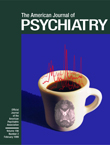Diazepam Treatment of Early Signs of Exacerbation in Schizophrenia
Abstract
OBJECTIVE: Therapeutic intervention at the earliest phase of symptom exacerbation in schizophrenia is an important clinical need, but specific pharmacotherapeutic interventions for this phase of illness have not been established. This study examined diazepam efficacy for this phase of treatment. METHOD: A double-blind, randomized clinical trial with 53 schizophrenic patients compared diazepam with placebo (with fluphenazine treatment for a comparison group). Treatment was initiated at the earliest signs of exacerbation, and symptom progression was the dependent measure used to evaluate efficacy. RESULTS: Diazepam was statistically superior to placebo in preventing symptom progression and was comparable to fluphenazine. CONCLUSIONS: Efficacy data support the use of diazepam in treating prodromal and early warning signs of symptom exacerbation in schizophrenia. This therapeutic strategy may be especially important for patients who refuse antipsychotic drugs or as a supplemental approach in a treatment plan that emphasizes low-dose antipsychotic therapy.



